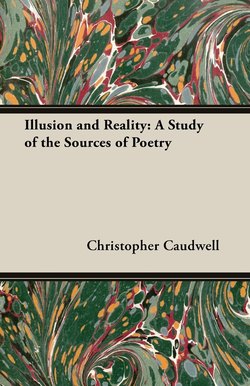Читать книгу Illusion and Reality: A Study of the Sources of Poetry - Christopher Caudwell - Страница 18
На сайте Литреса книга снята с продажи.
4
ОглавлениеThe bourgeois sees man’s instincts—his “heart”, source of his desires and aims—as the source of his freedom. This is false inasmuch as the instincts unadapted are blind and unfree. But when adapted by the relations of society they give rise to emotions, and these adaptations, of which the emotions are the expression and mirror, are the means whereby the instinctive energy of men is diverted to drive the machine of society: the machine of society, revolving, enables man to face Nature and struggle with her, not as individual, instinctive man but as associated, adapted men. Thus the instincts drive on the movement which secures man’s freedom. This illusion and this truth about the relation of the instincts to freedom and society work themselves out in bourgeois poetry and constitute its secret energy and constant life. Thus, knowing the essence of this bourgeois illusion to be a special belief concerning “individualism” or the “natural man”, which in turn derives from the conditions of bourgeois economy, we cannot be surprised that the bourgeois poet is the lonely man who, apparently turning away from society into himself, by so doing expresses the more strongly the essential relations of contemporary society. Bourgeois poetry is individualistic because it expresses the collective emotion of its era.
We saw that all literary art—originally generated by the passage of mythology into religion, so that poetry separated itself from mythology—is rooted in freedom, and is the expression of the spontaneity of society, which in turn is based on the material products of society and is a kind of mould of the emotional relations these material products demand of associated man. It is because art is the expression of freedom that, in a developed class-society, art is an expression of the illusion, not of all society but only of the ruling class. In the course of the development of the bourgeois illusion, literary art in turn separates the story from poetry. Poetry, younger, more primitive, more emotionally direct, is therefore in capitalist culture concerned with the emotions struck from the instincts—like sparks from flint—in the conditioning of instinctive responses by the relations of society. It expresses that part of the bourgeois illusion which sees the heart and the feelings of the individual man as the source of freedom, life and reality, because the freedom of society as a whole rests ultimately on the drive of those instincts whose struggle with Nature has created society. Because it must use the collective world of language it focuses all the emotional life of society in one giant “I” which is common to all, and gives to all men one breathless experience.
The story takes the reverse of the tapestry, and expresses the instincts as they emerge in society in one adapted individual. In this case the individualism of bourgeois society is expressed as an interest in men not as abstracted into one common experience, but as characters, as social types living in a real world.
We shall understand the way in which the bourgeois illusion gives rise to poetry, how this self-contradiction works itself out in actual poems, when we have studied (a) the development of English poetry in the persons of representative poets, schools and trends, (b) the technique of poetry, (c) its relation to language as a whole, (d) the nature of the impact of the poet’s life on his environment, and (e) the particular way in which this impact gives rise to poems.
1 Marx and Engels, The Communist Manifesto, 1848.
1 The Communist Manifesto.
1 The Communist Manifesto.
1 “The God to whom men pray, whether it be Compulsion or blind Fate, or all-fathering Zens” (Euripides).
